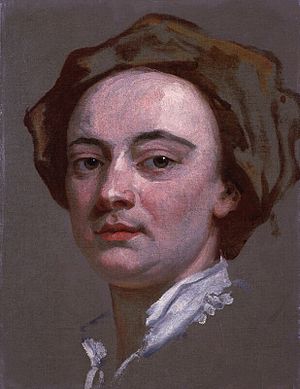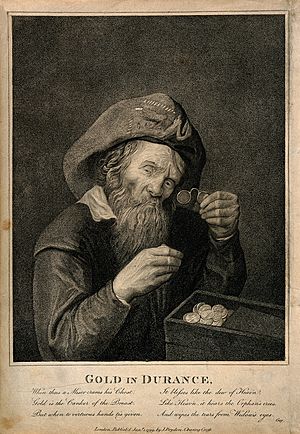John Gay facts for kids
Quick facts for kids
John Gay
|
|
|---|---|

Oil painting by Godfrey Kneller of an unknown man traditionally identified as John Gay
|
|
| Born | 30 June 1685 Barnstaple, England
|
| Died | 4 December 1732 (aged 47) London, England
|
| Known for | Poetry, drama, ballad opera |
|
Notable work
|
The Beggar's Opera |
| Patron(s) | William Pulteney, 1st Earl of Bath; The third Earl of Burlington; Charles Douglas, 3rd Duke of Queensberry; Prince William, Duke of Cumberland |
John Gay (born June 30, 1685 – died December 4, 1732) was an English poet and writer of plays. He was also a member of a famous group of writers called the Scriblerus Club. He is best known for his play The Beggar's Opera, which was a new kind of musical play called a ballad opera. The characters from this play, like Captain Macheath and Polly Peachum, became very popular.
Contents
His Early Life
John Gay was born in Barnstaple, England. He was the youngest of five children. His father, William Gay, died in 1695, and his mother, Katherine, died in 1694.
John went to the grammar school in Barnstaple. After school, he became an apprentice to a silk merchant in London. An apprentice learns a trade by working for someone experienced. However, John didn't like this job.
He soon went back to Barnstaple. There, his uncle, Reverend John Hanmer, helped with his education. Later, John returned to London to start his writing career.
Starting His Career
John Gay's first play was called The Mohocks (1712). It had some problems with censorship, meaning parts of it were not allowed to be shown. The next year, his comedy The Wife of Bath was performed at the Drury Lane Theatre.
Joining the Scriblerus Club
In 1713, Gay wrote a poem called Rural Sports. He dedicated it to another famous writer, Alexander Pope. This started a long friendship between them. Pope encouraged Gay to write The Shepherd's Week (1714). This was a series of six poems about country life in England.
In 1713, Gay and Pope both joined the Scriblerus Club. This was a group of writers who supported a political party called the Tories. Other famous members included John Arbuthnot, Jonathan Swift, and Thomas Parnell.
A Short Trip to Hanover
In 1714, John Gay got a job as a secretary. He worked for the Earl of Clarendon, who was the British ambassador to Hanover. Jonathan Swift helped him get this job.
However, this job did not last long. Queen Anne died just three months later. This ended Gay's hopes for a long career in government. While in Hanover, he met Caroline of Ansbach, who would later become the Princess of Wales.
Back in London
In 1715, Gay wrote The What D'Ye Call It?. This play made fun of serious plays of the time. It was performed in London and included a popular song called Twas When the Seas Were Roaring. George Frideric Handel helped write this song.
In 1716, Gay published a poem called Trivia, or the Art of Walking the Streets of London. This poem gave funny and detailed descriptions of London life. It was like a guide for people walking through the city. Jonathan Swift gave him some ideas for this poem.
In 1717, Gay wrote a comedy called Three Hours After Marriage. He worked on this with Alexander Pope and John Arbuthnot. In 1718, he also worked with George Frideric Handel on a musical play called Acis and Galatea. Gay wrote the words for the music.
Friends and Supporters
John Gay had many friends and supporters, called patrons. These were wealthy people who helped artists and writers with money or a place to live. In 1720, he published a book of poems. He earned a lot of money from people who subscribed (paid in advance) for the book.
That same year, he invested all his money in a company called the South Sea Company. This was during a time known as the South Sea Bubble. Many people invested in this company, hoping to get rich quickly. But the company failed, and Gay lost all his money. This made him very sick.
However, his friends and patrons helped him. People like William Pulteney and the Duke and Duchess of Queensberry supported him. He often visited Alexander Pope and received kindness from other writers like William Congreve.
In 1727, Gay wrote Fifty-one Fables in Verse for six-year-old Prince William. He hoped this would help him get a good job at court. He was offered a job as a gentleman-usher to another young princess. But he refused it, as his friends thought it was not a good enough position for him. Even so, he had a job as a lottery commissioner from 1722 to 1729, which paid him money, and he lived in the palace at Whitehall.
His Most Famous Play: The Beggar's Opera
John Gay's most famous work is The Beggar's Opera. It was first performed on January 29, 1728. This play was very new and different. It was a ballad opera, which meant it used popular songs of the time.
The play made fun of society and even some powerful people. One character, Peachum, was based on a real-life thief-taker named Jonathan Wild. Another character, Macheath, was like a famous highwayman. The play also made fun of Robert Walpole, who was a very powerful politician at the time. Gay showed that some people in power acted just like criminals.
The Beggar's Opera was a huge success. It ran for sixty-two nights, which was a very long time back then. People said it made the producer, John Rich, "gay" (happy) and John Gay "rich." Jonathan Swift had suggested the idea for the play.
Later Years and Legacy
After the success of The Beggar's Opera, Gay wrote a sequel called Polly. This play continued the adventures of Polly Peachum. However, the government's Lord Chamberlain (who controlled plays) would not allow it to be performed. This was probably because it also made fun of powerful people like Robert Walpole.
Even though it wasn't performed, the ban actually helped Gay. It made Polly very famous, and when it was published as a book in 1729, Gay earned a lot of money from it. The Duchess of Queensberry, one of his patrons, was even fired from court for helping him sell copies of the book.
The Duke of Queensberry gave John Gay a home. The Duchess continued to support him until he died in London on December 4, 1732. John Gay was buried in Westminster Abbey, a very famous church where many important people are buried. His friend Alexander Pope wrote the words on his tomb. Below Pope's words, Gay's own funny lines are written:
Life is a jest, and all things show it,
I thought so once, but now I know it.
Works
Here are some of John Gay's works:
- Wine – 1708
- The Present State of Wit – 1711
- The Wife of Bath – 1713
- The Rural Sports – 1713
- The Shepherd's Week – 1714
- The What D'Ye Call It – 1715
- Trivia, or The Art of Walking the Streets of London – 1716
- Three Hours After Marriage – 1717
- Acis and Galatea – 1718
- Dione – 1720
- Poems on Several Occasions – 1720
- The Captives – 1724
- Fables (also known as Fifty-one Fables in Verse or Fables of John Gay) – 1727 (Part the Second – 1738)
- The Beggar's Opera – 1728
- Polly – 1729
- Achilles – 1733
- The Distress'd Wife – 1743
See also
 In Spanish: John Gay para niños
In Spanish: John Gay para niños
 | Jewel Prestage |
 | Ella Baker |
 | Fannie Lou Hamer |


